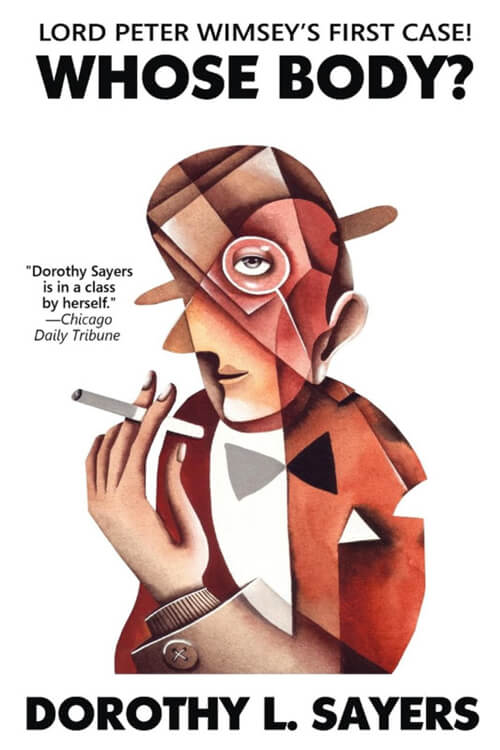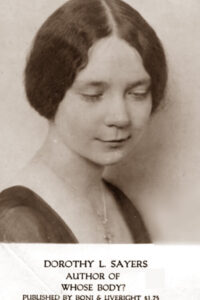
Whose Body? A Lord Peter Wimsey Novel
“Oh, damn!” said Lord Peter Wimsey at Piccadilly Circus. “Hi, driver!”
The taxi man, irritated at receiving this appeal while negotiating the intricacies of turning into Lower Regent Street across the route of a 19 ’bus, a 38-B, and a bicycle, bent an unwilling ear.
“I’ve left the catalog behind,” said Lord Peter deprecatingly. “Uncommonly careless of me. D’you mind puttin’ back to where we came from?”
“To the Savile Club, sir?”
“No—110 Piccadilly—just beyond—thank you.”
“Thought you were in a hurry,” said the man, overcome with a sense of injury.
“I’m afraid it’s an awkward place to turn in,” said Lord Peter, answering the thought rather than the words. His long, amiable face looked as if it had generated spontaneously from his top hat, as white maggots bred from Gorgonzola.
The taxi, under the severe eye of a policeman, revolved by slow jerks, with a noise like the grinding of teeth.
The block of new, perfect, and expensive flats in which Lord Peter dwelt on the second floor, stood directly opposite Green Park, in a spot for many years occupied by the skeleton of a frustrated commercial enterprise. As Lord Peter let himself in he heard his man’s voice in the library, uplifted in that throttled stridency peculiar to well-trained persons using the telephone.
“I believe that’s his lordship just coming in again—if your Grace would kindly hold the line a moment.”
“What is it, Bunter?”
“Her Grace has just called up from Denver, my lord. I was just saying your lordship had gone to the sale when I heard your lordship’s latchkey.”
“Thanks,” said Lord Peter; “and you might find me my catalog, would you? I think I must have left it in my bedroom, or on the desk.”
He sat down to the telephone with an air of leisurely courtesy as though it were an acquaintance dropped in for a chat.
“Hullo, Mother—that you?”
“Oh, there you are, dear,” replied the voice of the Dowager Duchess. “I was afraid I’d just missed you.”
“Well, you had. I’d just started off to Brocklebury’s sale to pick up a book or two, but I had to come back for the catalog. What’s up?”
“Such a quaint thing,” said the Duchess. “I thought I’d tell you. You know little Mr. Thipps?”
“Thipps?” said Lord Peter. “Thipps? Oh, yes, the little architect man who’s doing the church roof. Yes. What about him?”
Read or download Book
Dorothy L. Sayers
Dorothy Leigh Sayers (13 June 1893 – 17 December 1957) was an English crime novelist, playwright, translator and critic.
Born in Oxford, Sayers was brought up in rural East Anglia and educated at Godolphin School in Salisbury and Somerville College, Oxford, graduating with first-class honors in medieval French. She worked as an advertising copywriter between 1922 and 1929 before success as an author brought her financial independence. Her first novel, Whose Body?, was published in 1923. Between then and 1939 she wrote ten more novels featuring the upper-class amateur sleuth Lord Peter Wimsey. In 1930, in Strong Poison, she introduced a leading female character, Harriet Vane, the object of Wimsey’s love. Harriet appears sporadically in future novels, resisting Lord Peter’s proposals of marriage until Gaudy Night in 1935, six novels later.
Sayers moved the genre of detective fiction away from pure puzzles lacking characterization or depth and became recognized as one of the four “Queens of Crime” of the Golden Age of Detective Fiction of the 1920s and 1930s, along with Agatha Christie, Margery Allingham, and Ngaio Marsh. She was a founder member of the Detection Club and worked with many of its members in producing novels and radio serials collaboratively, such as the novel The Floating Admiral in 1931.
From the mid‐1930s Sayers wrote plays, mostly on religious themes; they were performed in English cathedrals and broadcast by the BBC. Her radio dramatization of the life of Jesus, The Man Born to Be King (1941–42), initially provoked controversy but was quickly recognized as an important work. From the early 1940s, her main preoccupation was translating the three books of Dante’s Divine Comedy into colloquial English. She died unexpectedly at her home in Essex, aged 64, before completing the third book.
Life and career
Sayers was born on 13 June 1893 at the Old Choir House in Brewer Street, Oxford; she was the only child of the Rev Henry Sayers and his wife Helen “Nell” Mary, née Leigh. Henry Sayers, born at Tittleshall, Norfolk, was the son of the Rev Robert Sayers, from County Tipperary, Ireland. At the time of Sayers’s birth, her father was headmaster of Christ Church Cathedral School and chaplain of Christ Church, one of the colleges of the University of Oxford. Her mother, born in Shirley, Hampshire, was the daughter of a solicitor descended from landed gentry on the Isle of Wight. Sayers was proud of the Leigh connection and later considered calling herself “D. Leigh Sayers” in professional matters, before settling for “Dorothy L. Sayers”—insisting on the inclusion of the middle initial.






